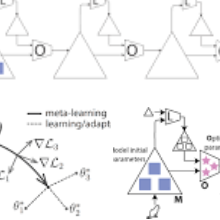Meta-learning provides a popular and effective family of methods for data-efficient learning of new tasks. However, several important issues in meta-learning have proven hard to study thus far. For example, performance degrades in real-world settings where meta-learners must learn from a wide and potentially multi-modal distribution of training tasks; and when distribution shift exists between meta-train and meta-test task distributions. These issues are typically hard to study since the shape of task distributions, and shift between them are not straightforward to measure or control in standard benchmarks. We propose the channel coding problem as a benchmark for meta-learning. Channel coding is an important practical application where task distributions naturally arise, and fast adaptation to new tasks is practically valuable. We use our MetaCC benchmark to study several aspects of meta-learning, including the impact of task distribution breadth and shift, which can be controlled in the coding problem. Going forward, MetaCC provides a tool for the community to study the capabilities and limitations of meta-learning, and to drive research on practically robust and effective meta-learners.
翻译:元学习为数据效率新任务学习提供了一套广受欢迎的有效方法,然而,元学习中的若干重要问题至今难以研究。例如,在现实世界环境中,元学习者必须从广泛的和潜在的多种模式的培训任务分配中学习;在元培训任务分配和元测试任务分配之间存在分配变化时,元学习的绩效下降;这些问题通常很难研究,因为任务分配的形式,在标准基准中衡量或控制这些变化并非直截了当。我们提议将渠道编码问题作为元学习的基准。在任务分配自然产生和对新任务迅速适应的情况下,渠道编码是一项重要的实用应用。我们利用MetCC基准研究元学习的若干方面,包括任务分配的广度和转移的影响,这些影响可以控制在编码问题上。向前看,MetCC为社区提供了一个工具,用于研究元学习的能力和局限性,以及推动关于实际稳健和有效的元学习的研究。


